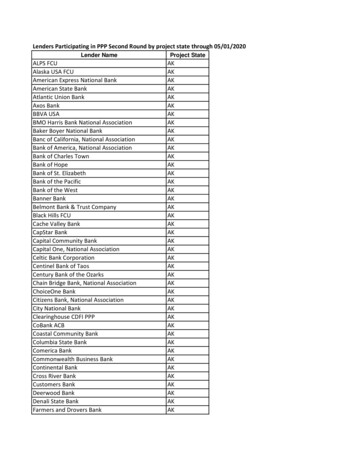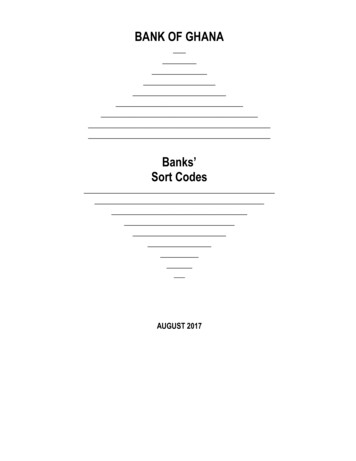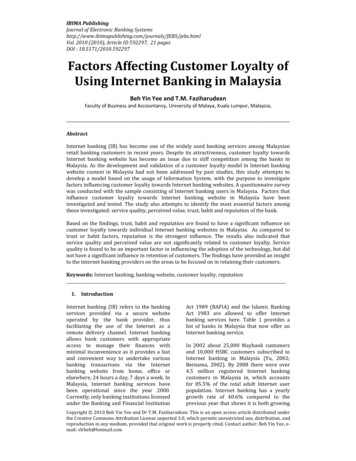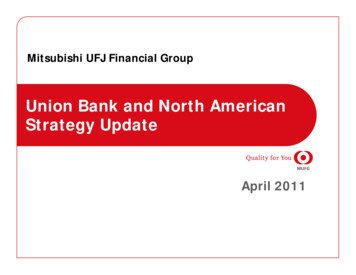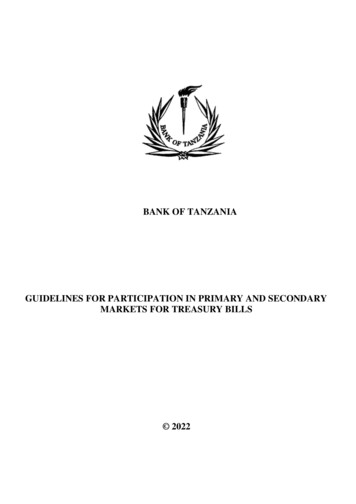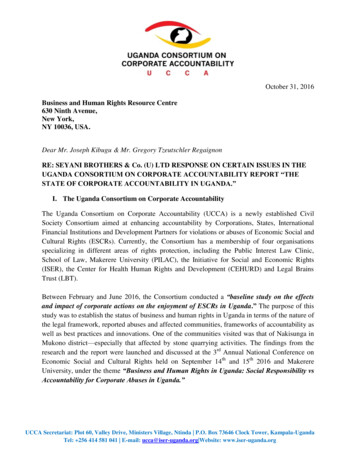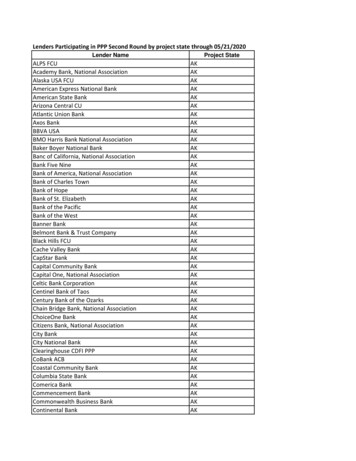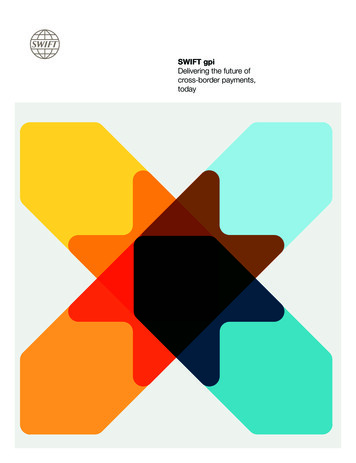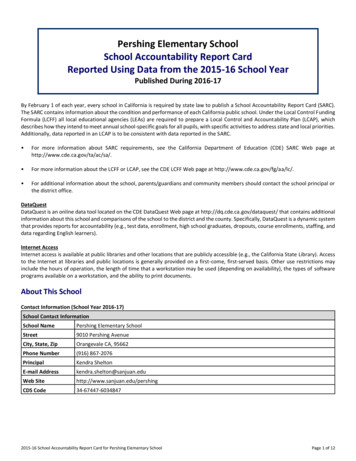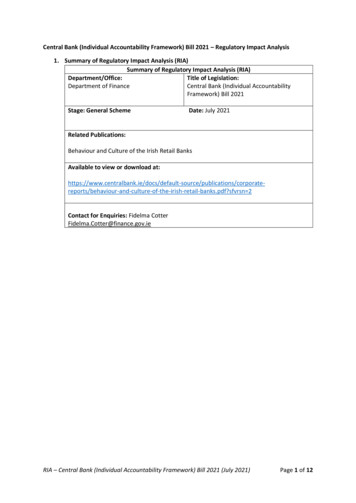
Transcription
Central Bank (Individual Accountability Framework) Bill 2021 – Regulatory Impact Analysis1. Summary of Regulatory Impact Analysis (RIA)Summary of Regulatory Impact Analysis (RIA)Department/Office:Title of Legislation:Department of FinanceCentral Bank (Individual AccountabilityFramework) Bill 2021Stage: General SchemeDate: July 2021Related Publications:Behaviour and Culture of the Irish Retail BanksAvailable to view or download e-of-the-irish-retail-banks.pdf?sfvrsn 2Contact for Enquiries: Fidelma CotterFidelma.Cotter@finance.gov.ieRIA – Central Bank (Individual Accountability Framework) Bill 2021 (July 2021)Page 1 of 12
The following policy options have been considered in relation to the Central Bank(Individual Accountability Framework) Bill:1. No intervention2. Implement an Individual Accountability Framework based on therecommendations put forward by the Central Bank of Ireland in the 2018 report“Behaviour and Culture of the Irish Retails Banks”.Preferred option: Option 2The implementation of the Individual Accountability Framework as recommended by theCentral Bank of Ireland is being pursued by the Department of Finance through theCentral Bank (Individual Accountability Framework) Bill with changes, as necessary, toensure the constitutionality and practicality of the Bill.Option 1 was discounted as it would maintain the current regulatory approach, which theCentral Bank has recognised as requiring improvement. The Government decision tointroduce a Senior Executive Accountability Regime in the financial services industrywould not be implemented.The Programme for Government commitment to introduce SEAR would not be fulfilled.No change in the law would mean that the practical legal changes that are required toprovide for individual accountability in the financial services sector would not beachieved. Efforts to improve public trust and achieve positive outcomes for customers offinancial institutions would also not be achieved.2. Statement of Policy Problem and ObjectivePolicy Context and ObjectiveIt is the Government’s objective, as outlined in the Programme for Government: Our SharedFuture, to introduce the Senior Executive Accountability Regime (SEAR) to deliver heightenedaccountability in the banking system.There have been failings within the financial industry in the financial crisis and in specificinstances in recent years. These failings have had severe financial and other consequences forcustomers of the financial sector. There have been negative financial and reputational impactsfor financial institutions with low levels of public trust.Serious shortcomings in the culture of Irish retail banks were identified in the Central Bank’s2018 report, ‘Behaviour and Culture of the Irish Retail Banks’, prepared at the request of theMinister for Finance following revelations relating to banks’ treatment of customers withtracker mortgages.RIA – Central Bank (Individual Accountability Framework) Bill 2021 (July 2021)Page 2 of 12
The introduction of the Individual Accountability Framework will build on the reforms thathave taken place in the regulation of the financial sector in Ireland since the financial crisis,and introduce new financial regulation, with an emphasis on individual and personalaccountability and responsibility.The Senior Executive Accountability Regime (SEAR) will place obligations on certain customerfacing firms and senior individuals within them to set out clearly where responsibility anddecision-making lies.The legislation will also introduce Conduct Standards for individuals and firms to imposebinding and enforceable obligations on all Regulated Financial Service Providers (RFSPs) andindividuals working within them with respect to expected standards of conduct.The legislation will provide for enhancements to the existing Fitness & Probity Regime toensure the more effective operation of the regime and its ability to support the individualaccountability framework.The legislation will break the “Participation Link” which requires the Central Bank to first provea contravention of financial services legislation against an RFSP before it can take enforcementaction against an individual.The legislation will also provide for certain technical amendments to improve existinglegislation and to clarify and streamline certain statutory processes.The legislation is intended to: Act as a driver for recognition of responsibilities by individuals in order to mitigate therisk of misconduct by firms, and deliver better outcomes for consumers andprotecting markets. Introduce Conduct Standards for Controlled Function roles in all firms, which willprovide a sense of shared values and will empower staff within firms to question orchallenge how firms go about their business. Clarify the lines of responsibility and decision-making processes within relevant firms. Build on the Central Bank’s existing powers, and enhance the Central Bank’s ability tohold senior executives and other individuals to account. Bring efficiencies to the supervisory and enforcement work of the Central Bank byensuring greater transparency regarding who is responsible for what, and how rolesand responsibilities work together. Improve governance and culture across the financial sector.RIA – Central Bank (Individual Accountability Framework) Bill 2021 (July 2021)Page 3 of 12
3. Identification and Description of OptionsOption 1: Do nothing or no interventionThe ‘do nothing’ option is primarily being included for benchmarking purposes. It is not beingexamined in detail as part of this RIA, because it is not envisaged that this option will bepursued in practice.To take no action would mean that:- the Government decision to introduce a Senior Executive Accountability Regime in thefinancial services industry would not be achieved;- the Programme for Government commitment to introduce SEAR would not be fulfilled;and- No change in the law would mean that the practical legal changes that are required toprovide for individual accountability in the financial services sector would not be achieved.Efforts to improve public trust and achieve positive outcomes for customers of financialinstitutions would also not be achieved.Option 2: Implement the Individual Accountability Framework as recommended by theCentral Bank of IrelandThe Individual Accountability Framework, as provided for in the proposed legislation, is basedon proposals made by the Central Bank of Ireland in its 2018 report, ‘Behaviour and Cultureof the Irish Retail Banks’. These, in turn, are modelled on the Senior Managers andCertification Regime (SMCR) operated in the United Kingdom by the two financial regulators,the Prudential Regulation Authority and the Financial Conduct Authority. The SMCR is widelyconsidered to be a very successful regulatory regime, and has served as the model for similarregimes in other jurisdictions, including Australia, Hong Kong, and Singapore. Feedback fromindustry in the UK in relation to the SMCR has been broadly positive, with reservations focusedon elements that are not replicated in the Irish legislation, particularly the operation ofRegulatory References. The Central Bank’s proposals have been adapted to take full accountof the constitutional rights of all persons concerned.The IAF will support positive cultural change by providing banks and other regulated financialservices providers with the tools on which a positive culture is built. It will also introducegreater individual responsibility and accountability, particularly at senior management level.The Financial Stability Board, an international body that monitors and makesrecommendations about the global financial system, has identified lack of accountability as akey cultural driver of misconduct and the Board has recommended that national authoritiesidentify and assign key responsibilities, hold individuals accountable and assess the suitabilityof individuals who are assigned key responsibilities.The IAF will comprise the following elements:RIA – Central Bank (Individual Accountability Framework) Bill 2021 (July 2021)Page 4 of 12
Standards of behaviour for regulated financial service providers and the individualsworking within them (‘Conduct Standards’);A Senior Executive Accountability Regime which ensures clearer accountability byplacing obligations on firms and senior individuals within them to set out clearly whereresponsibility and decision-making lies for their business; andEnhancements to the current Fitness and Probity (F&P) Regime and theAdministrative Sanctions Procedure (ASP) to strengthen the onus on firms toproactively assess individuals in controlled functions on an ongoing basis, to surmountsome current limitations of the F&P investigative function, and to adapt the ASP tothe needs of the IAF.Breaking the participation link allows for improved individual responsibility and allowsfor sanctions to be enforced on individuals separately to firms. This addresses theknown deficiency in the legislation which requires the Central Bank to first prove acontravention of financial services legislation against an RFSP before it can take actionagainst an individual who participated in that contravention.SEAR and Conduct StandardsThe IAF will set out what are reasonable and expected standards of behaviour of staff in theregulated financial services industry. These standards (for both staff and businesses) are thosethat would be expected in any well run and ordered business.It will also provide clarity to firms and to the regulator as to who is responsible for what, andhow decisions are made within firms. Enhancing individual accountability is integral to theregulation of firms, sets a solid foundation for more efficient communication and quickerresolution of issues, and improves decision-making. The ambition is to foster an effectiveculture and clarity of responsibilities such that staff and senior managers within firms promoteconsumer interests and proactively address problems.Where firms’ cultures clearly demonstrate appropriate behaviours and acceptance ofresponsibility, regulatory authorities can place increased reliance on these firms, enabling amore efficient and effective prioritisation of regulatory resources. In those cases whereregulatory issues arise, the framework will facilitate, depending on the particularcircumstances, holding firms and/or individuals to account and provide a range of tools toaddress misconduct.The Conduct Standards will apply across the regulated financial services sector. The SeniorExecutive Accountability Regime will focus on sectors of the financial services industry thathave a greater customer focus and where the protection of consumer interests is essential.RIA – Central Bank (Individual Accountability Framework) Bill 2021 (July 2021)Page 5 of 12
The provisions also recognise the importance of collective decision making in financial servicesorganisations as well as individual accountability and the need to recognise the role ofindividuals in both aspects of their employment.Senior Executive Accountability Regime (SEAR)The collective decisions of the board and senior management draw on contributions from arange of individuals with distinct responsibilities. From both a firm, individual and regulatoryperspective, it is important to be clear on who is responsible for what within a firm and howdecisions are made within a firm’s governance structures. Insisting on clarity in respect ofindividual responsibility reflects the priority that is placed on a culture of good conduct andthe need for accountability. Lack of clarity makes it difficult to hold individuals accountablefor their actions and decisions.The SEAR will apply to those performing Senior Executive Functions (SEFs) in in-scope firms.This is the same cohort as PCFs. These SEFs would include board members, executivesreporting directly to the board and heads of critical business areas.Prescribed ResponsibilitiesEach SEF will have responsibilities, which are inherent to that role. The Central Bank will alsoprescribe mandatory responsibilities for firms, which must be allocated to individuals carryingout SEFs. This will ensure that there is an SEF accountable for all key conduct and prudentialrisks. Recognising that not all prescribed responsibilities will be relevant to every firm, therewill be a general list of prescribed responsibilities applicable to all firms, with tailored lists forindustry sectors and based on firms’ scale and complexity.Statements of ResponsibilitiesEach SEF will be required to have a documented Statement of Responsibilities, which clearlysets out their role and areas of responsibility. These statements are intended to promoteclarity and transparency of individual responsibilities and to provide for a more targetedassessment of the fitness and probity of SEFs by allowing their competence, knowledge,experience and qualifications to be measured against the responsibilities they have beenallocated. In addition, such Statements of Responsibilities also decrease the ability ofindividuals to claim that the culpability for misconduct or wrongdoing lies outside their sphereof responsibility, thereby making it easier to hold individuals to account. Financial institutionswill be required to keep Statements of Responsibilities up to date and submitted to the CentralBank.RIA – Central Bank (Individual Accountability Framework) Bill 2021 (July 2021)Page 6 of 12
Responsibility MapsEach firm in scope of SEAR will also be required to produce a Responsibility Map documentingkey management and governance arrangements in a comprehensive, accessible and clearsingle source of reference. These maps will include, inter alia, matters reserved to the board,terms of reference for key board committees, and reporting lines of SEFs to individuals,committees and, if applicable, within the wider group. Where firms are part of a larger group,they will be required to provide details of the interaction of the firm’s and the group’sgovernance arrangements. Financial institutions are required to keep Responsibility Maps upto date and submitted to the Central Bank.Enhancements to the Fitness and Probity RegimeThe Central Bank’s practical experience of the F&P Regime since its introduction in 2011 hasled to the identification of a number of aspects that should be strengthened as part of aholistic review of individual accountability.The Conduct Standards will complement the existing F&P Regime by delineating theresponsibilities of CFs (including PCFs). The introduction of a certification regime will obligefirms to certify on an annual basis that its CF staff are fit and proper persons to perform theirfunctions. A positive duty on firms to certify each CF will strengthen the regime and increasethe focus on the responsibility of firms for the conduct of their staff and their corporateculture.The F&P regime will be extended to apply to financial holding companies based in Ireland.4. Analysis of costs, benefits and other impacts for each optionCostBenefitOption 1CertainPotentially reducedNoprocesses ofexpenditure by the Bankinterventionthe Centraland more resourcesBank will beavailable to the Exchequerless efficient /cost-effectivethan if Option 2is pursued.Cultural issuesunderlyingrecent majorscandals in thefinancial sectorare notImpactReduced possibility ofseeking to restore trustin banking and thefinancial sector. Publictrust may be damagedfurther by the perceptionthat no effective action isbeing taken to addressspecific problems.Problems may emerge inthe future, which couldhave been prevented byadopting the IAF.RIA – Central Bank (Individual Accountability Framework) Bill 2021 (July 2021)Page 7 of 12
effectivelyaddressed.Reduced possibility ofimproving culture andpreventing pooroutcomes for customersin the absence ofappropriate legislativechanges.Reduced possibility ofdealing with badbehaviour throughabsence of relevantsanctions.Option 2Implementthe IndividualAccountabilityFramework asrecommendedby the CentralBank ofIrelandIt is likely thatimplementationof the newregimewillinvolve someadditionalexpense for theCentral Bank ofIreland(potentiallyreducingitssurplus incomepayable to theExchequer).It is not possibleto cost theenforcement ofthe legislationfollowingenactment. Itwill depend ona multitude ng howfirmsandindividualsthemselvesengage with theintroductionand bedding inThe legislation will help tobegin to restore publictrust in the banking sectorand the financial servicessector more generally. Itwill deter wrongdoing infinancial firms by ensuringthe personalaccountability of thoseresponsible for any suchwrongdoing.Based on experience withsimilar legislation in otherjurisdictions, thelegislation will also benefitregulated financial serviceproviders by creatinguseful and effectivemanagement andgovernance tools.The proposed IAF isintended to bring manybenefits, including that itwill: Act as a driver forpositivebehaviours andrecognition ofresponsibilities byindividuals inorder to mitigateImproved culture infinancial servicesindustry with potentialto prevent badbehaviour and reducethe potential for fines.The ultimate objective ofthe IAF is to achievebetter outcomes forconsumers, to improvethe sustainability of thefinancial system and todrive higher standards ofbehaviour andgovernance in financialservices firms.Enforceable ConductStandards will set outthe behaviour expectedof all regulated firms andkey individuals workingwithin them, seeking toprovide a sense ofshared values andempower individuals atall levels in theorganisation to speak upand challenge issues thatarise in their firms.RIA – Central Bank (Individual Accountability Framework) Bill 2021 (July 2021)Page 8 of 12
of the relevantprocesses andprocedures andthe extent towhich there areinvestigationsand inquiriesunderthenewly amendedenforcementprocesses.There will becosts toindustry incomplying withthe proposedlegislation.Every regulatedfirm will haveto comply withthe certificationrequirementsof theenhancedfitness andprobity regimeand providetraining to staffon theirobligationsunder theConductStandards.Firms in sectorsin scope of theSeniorExecutiveAccountabilityRegime willface additionalcosts in relationto thepreparationandmaintenance ofresponsibility the risk ofmisconduct byfirms, deliveringbetter outcomesfor consumers andprotectingmarkets.Introduce ConductStandards forControlledFunction roles inall firms, whichwill provide asense of sharedvalues and willempower staffwithin firms toquestion orchallenge howfirms go abouttheir business.Clarify the lines ofresponsibility anddecision-makingprocesses withinrelevant firms.Build on theCentral Bank’sexisting powers,and enhance theCentral Bank’sability to holdsenior and otherindividuals toaccount.Bring efficienciesto the supervisoryand enforcementwork of theCentral Bank dueto greatertransparencyregarding who isresponsible forwhat, and howroles andPublic trust begins to berestored and Ireland’sreputation as home to aneffectively regulatedfinancial sector isenhanced.More efficient andtargeted use of CentralBank resources.Potentially increasedadministrative burdenfor smaller financialservices firms.Increased complianceburden on industryoffset by improvementsin internal governanceand operations to thebenefit of the firm.Adopting SEAR and otherchanges maysupplement internalplanning andorganisational processesand use less thanexpected resources.RIA – Central Bank (Individual Accountability Framework) Bill 2021 (July 2021)Page 9 of 12
maps andstatements ofresponsibilities.It is likely that,after the initialmeasures tocomply withthe legislation,the ongoingcost ofcompliance willbe less as firmsbecome morefamiliar withtheirobligations.Given that thechanges in thelaw seek tochange cultureand practice,properimplementationof the lawshould changebehaviour andprevent poorbehaviourarising whichhas in the pasthad negativefinancialimpacts forcustomers andfor financialinstitutions.It is also likelythat, for manyfirms, themeasuresrequired tocomply withthe legislationare alreadylargely part oftheir duediligence and responsibilitieswork together.Improvegovernance andculture across thefinancial sector.RIA – Central Bank (Individual Accountability Framework) Bill 2021 (July 2021)Page 10 of 12
governancecontrols.5. ConsultationThe objective of the introduction of an Individual Accountability Framework is to achievebetter outcomes for consumers, to improve the sustainability of the financial system and todrive higher standards of behaviour and governance in financial services firms.Following the publication of its Report on “Behaviour and Culture of the Irish Retails Banks”,the Department engaged with the Central Bank in order to devise policy to ensure that theCentral Bank has the powers it needs to regulate effectively, while safeguarding theconstitutional rights of all concerned.The Department has engaged at length with the Attorney General’s Office and the CentralBank to ensure that the legislation is both effective and constitutionally robust. The additionalpowers that will be provided to the Central Bank are significant, and it is important that thecorrect balance between these powers and the protection of individuals’ constitutional rightsis struck. It is also imperative that the new provisions can withstand legal challenge.The Department has engaged with relevant stakeholders throughout the initial processproviding a broad understanding of the aims of the legislation. It will continue to do sofollowing Government approval to publish the draft General Scheme.The broad outlines of the legislation have also been flagged in responses to ParliamentaryQuestions and in speeches by the Minister and by senior officials of the Central Bank.6. Enforcement and ComplianceThe proposal will be implemented by way of primary legislation. Incorporated in this is arequirement for Oireachtas approval for both the Bill and any future amendments to the Actthereafter.The Bill provides the Central Bank with powers to enforce compliance with the legislation.7. ReviewConsultationAn integral part of the RIA process is to identify ways of periodically reviewing legislation toevaluate the extent to which it is achieving its objectives. This can be achieved in a number ofways such as:(i)Consulting with stakeholders(ii)Establishing review groupsRIA – Central Bank (Individual Accountability Framework) Bill 2021 (July 2021)Page 11 of 12
As regards performance indicators, the most effective way of ascertaining how well thelegislation is performing will be through establishing levels of satisfaction amongststakeholders.Given that the legislation amends the Central Bank Acts, there will be consultation with theEuropean Central Bank (ECB) following the publication of the Bill.The Central Bank also intends to conduct an extensive consultation exercise with the financialservices sector once the legislation is enacted.Publication of the draft General Scheme allows time for further consultation with potentiallyimpacted parties.EvolutionThe purpose of the legislation is to put in place the Individual Accountability Framework andto foster improved culture in the financial sector. Therefore, continuous engagement withrelevant stakeholders, including by the Central Bank of Ireland, will be important to ensurethat the legislation is achieving its objectives.The Minister for Finance is also required to be consulted as part of the process of makingRegulations by the Central Bank for the purpose of implementing the legislation.Public AccountabilityFrom a public accountability perspective, the Governor and/or other senior officials of theBank shall report to a Committee of the Oireachtas as required under the existing Central Banklegislative framework. The Minister is also answerable to the Oireachtas.8. PublicationThis RIA and any future versions of the document shall be published in accordance with theRIA Guidelines for publication. It shall be published on the Department of Finance website andaccompanied by a link to the Bill.RIA – Central Bank (Individual Accountability Framework) Bill 2021 (July 2021)Page 12 of 12
RIA - Central Bank (Individual Accountability Framework) Bill 2021 (July 2021) Page 5 of 12 Standards of behaviour for regulated financial service providers and the individuals working within them ('Conduct Standards'); A Senior Executive Accountability Regime which ensures clearer accountability by
